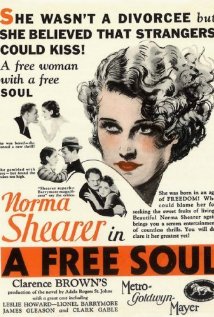
A FREE SOUL
US, 1931, 93 minutes, Black and white.
Norma Shearer, Leslie Howard, Lionel Barrymore, Clark Gable, James Gleason, Lucy Beaumont.
Directed by Clarence Brown.
A Free Soul was one of the notable films from 1931, Lionel Barrymore winning an Oscar for Best Actor and Norma Shearer, who won the Oscar the year before for The Divorcee, also nominated. The film was directed by Clarence Brown, one of the distinguished directors at MGM, a favourite for Greta Garbo, making many polished films in 1930s and 40s, as well as The Yearling and National Velvet in the 1940s.
This is a story of a wilful young woman played by Norma Shearer. Her mother had died in childbirth and she has been brought up by her lawyer father, a workaholic with a severe drinking problem, his own father having finished up in an insane asylum. He had fostered her independence and free spirit. They come from a wealthy and snobbish family, and she is engaged to an English polo player, played by Leslie Howard (who was to act with Norma Shearer in Romeo and Juliet).
The film opens with the lawyer winning the freedom of an accused murderer and gambler, played with very steady aplomb by Clark Gable. The young woman becomes infatuated with the gambler, beginning an affair with him, to the desperation of her fiance, to the disgust of her father. She makes a bargain with him that she will give up the gambler if he gives up the drink – and they go for several weeks into the Rockies, accompanied by the lawyer’s assistant, played by James Gleason. They are successful for some time, but, ultimately, the lawyer goes on the drink again, and the young woman is rejected by her family.
She goes again to the gambler but he makes demands on her, as well as on her fiance. There is a melodramatic development when the fiance goes to the gambler’s office and shoots him. The lawyer then defends the young man, bringing his daughter to the witness box, going through her life, ultimately blaming himself for her life and for the situation leading the young man to shoot the gambler. And then he collapses.
Lionel Barrymore, a star at MGM for the next 20 plus years, ultimately confined to a wheelchair which did not confine his career, gives a tour de force performance.
1. A prestige film of 1931? MGM production values? San Francisco settings, the Rockies (in the studio)? The court, prison, gambling casinos in the age of prohibition, mansions, the outdoors? The musical score? The cast?
2. The focus on Stephen Ashe, Lionel Barrymore’s presence and performance, Oscar-winning? The background story, his alienation from his mother, her disapproval of his drinking? Avoiding her, having to go to the birthday party, arriving drunk, with Ace, the confrontations? His performance in court, his having fallen on hard times, the evidence of the hat for the gambler, putting it on the gambler’s head and its not fitting, the gambler’s release? Seeming friendship with the gambler, going to his club, later turning against him, calling him a mongrel, disapproving of his daughter’s relationship with him after the shock of discovering her there? His love for his daughter, fostering her free spirit? His shock at her affair? Her bargain, his going off the drink, consenting, going out into the mountains, with his friend Eddie who supplied him with liquor, his inability to sleep, going on the drink again? His collapse?
3. Jan, the free soul, the death of her mother, her snobbish family, love for her grandmother, the visit for the birthday, her devotion to provide, Dwight, his proposal, the possibility for a marriage, yet her wanting to be free? The initial meeting with Ace, the attraction, the aftermath of the case, going to him, the affair, her moving in, her drunken father discovering her presence? The deal, his going off the drink, her giving up Ace? In the mountains, the note, the tearing it up? Her father’s relapse? Her going to Ace? His wanting to marry her, his rough stances, rid of his previous mistress, the confrontation, the attempted kiss, her leaving, Dwight and his arrival, hearing Ace’s threats?
4. Dwight, British, polo player, in love with Jan, the proposal, his accepting her relationship with Ace, going to see her, hearing the threats? His going to Ace, shooting him? Confessing? Prison, Jan’s visit? In the court, not wanting a trial, not wanting Stephen to defend him, not wanting Jan in the witness box? His desperation in listening?
5. Ace, mob, corrupt, drugs, drink, white slavery, his staff, the club, his confidence, changing tie for Jan’s colour, in court, the hat, getting off, coming with Stephen to the family dinner, their humiliating him? His relationship with Jan, love, the disappearance, return, his demands, violent threats, his death?
6. Eddie, the faithful friend, supplying the drink, support, love for Jan?
7. The grandmother, her age, the party, regrets about her son, love for Jan, her dying, Dwight with her, the family preventing Jan visiting her? Dwight bringing her to her grandmother?
8. The background of the legal system, the court cases, the prosecutors, juries, the judges, the speeches by the defence lawyers?
9. The more permissive scenario in the film made before the introduction of the Motion Picture Code?